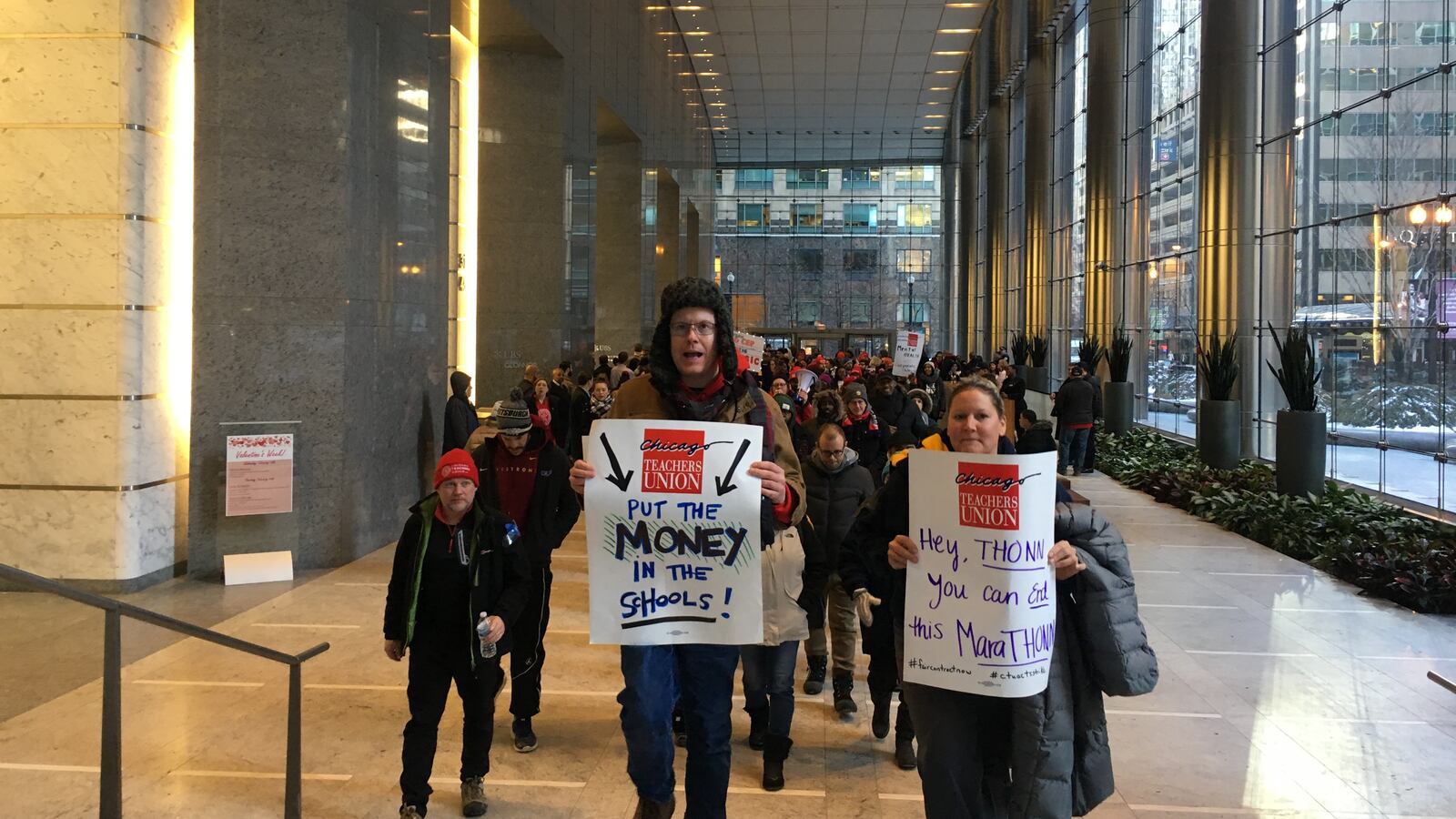After nine days on the picket line, teachers and paraprofessionals at four Chicago International Charter Schools were back in class Tuesday — with many of them cheering the 8 percent pay raise many will see under their new contract. There was also widespread relief among educators that the deal avoided most of the threatened classroom-level cuts.
“We’re really excited to be back in school and really proud of what we won in our tentative agreement,” said Jen Conant, a high school teacher at CICS Northtown and a member of the Chicago Teachers Union charter division bargaining team.
Union and management reached a deal on Sunday night, following a contentious nine-day strike that started with picketing in front of schools and escalated late last week when dozens of teachers blocked the lobby of the Loop high-rise building where the network’s board president works. The walkout was the third-ever charter teachers strike in the country and the second in Chicago since December.
This strike impacted 175 educators at four schools serving a combined 2,200 students: Northtown Academy, Ralph Ellison, Wrightwood, and Chicago Quest. The network kept all schools open during the strike. Non-union personnel staffed the campuses, but few students showed up.
Until a few days ago, when the strike seemed poised to enter its third week, Christina Bargielowski, a paraprofessional at CICS Northtown, feared the toll of a protracted walkout.
“I was a little nervous for the financial aspect of it,” said Bargielowski, who like all educators walking the picket line was not paid during the strike. “I was ready to continue on strike week 3 if we needed to.”
In addition to the average 8 percent raise teachers would receive, the union said teachers salaries would meet the level of district teachers over the next four years. Meanwhile, paraprofessionals will be brought up to district pay scales, effective immediately. For Bargielowski, who has worked at Northtown for the past decade, that means her salary will rise to $38,000 a year, from $31,000.
The tentative agreement also sets a “goal” of 28 students per class with a clause limiting class sizes to 30, ensures full-time teaching assistants in all kindergarten, first- and second-grade classes, and includes a 7 percent pension contribution from the network.
Educators also touted their ability to stave off management’s demands to get rid of maternity and paternity leave for paraprofessionals, and to cut counselors and social workers in exchange for pay raises.
“Our social workers were really threatened in this contract,” said Amanda Legner, a paraprofessional who teaches in CICS Northtown’s transition room, where special education students are taught to fill out job applications and to run a small cafe. “We were not willing to let that happen. That’s a really big win.”
The network had warned during the strike that it could face bankruptcy if it acceded to the union’s full pay demands. With the new contract, the network said schools would lose full-time instructional coach positions and some technology funding, and schools would no longer be granted free unlimited photocopying. Instructional coaches are teachers not assigned to a specific classroom; they work one-on-one with students and coach new teachers.
“We were firm about how much we could afford, and we are satisfied with that,” said LeeAndra Khan, the CEO of Civitas Education Partners, which manages the striking CICS schools. “Overall, [the strike] was a great learning experience.”
Kha Tran, a second-year social studies teacher at CICS Northtown, said his students are “happy to be back and see teachers and other adults who care about them.”
He added: “They kind of got right back to it.”
The deal, which union members are expected to ratify later this week, was the latest display of the Chicago Teachers Union’s organizing muscle ahead of several high-stakes contract negotiations. The Chicago Public Schools contract, for one, expires in the spring, and several other charter contracts still under negotiation.
CICS oversees 14 schools. The strike affected only the four schools that Civitas Education Partners manages and that are unionized. Since the negotiated contract applies only to those striking schools, educators at the 10 other network schools under different management now earn less than their counterparts.
A spokesperson for CICS said Monday that the organization was “committed to equity” across its other 10 campuses and is in internal discussions about how the bargaining will impact teachers and classrooms at its non-unionized schools.
Conant, the CICS Northtown high school teacher, said she hopes the strike shows other Chicago International educators that a walkout could help them attain higher salaries and call attention to their other demands.
“When teachers and paraprofessionals unite, they can make really important positive changes in their school communities,” she said. “Our schools are better when we can have a say in how our schools are run.”

